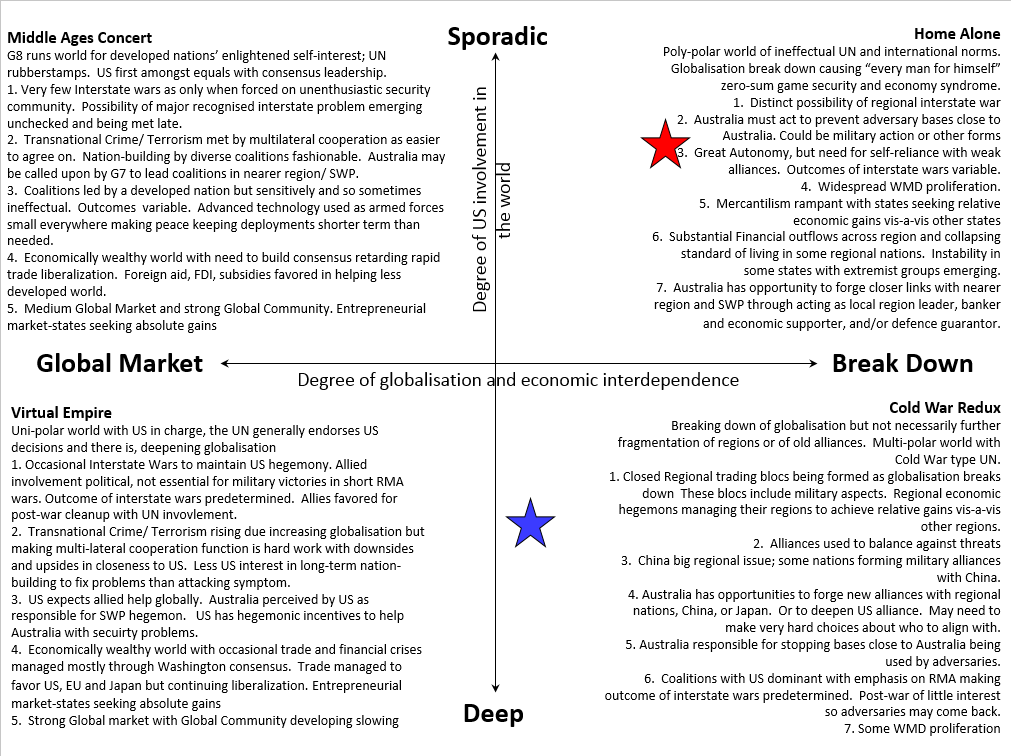Andrew Davies’ recent post on the possibility of Donald Trump as US President presents an interesting alternative future that could cause a fundamental rewrite of our defence plans. In concluding, he noted Andrew Carr’s concerns that the lack of deep thinking about such potential black swan events suggests our defence thinking is trapped within strongly institutionalised boundaries. There’s much truth in that, but first let’s unpack the matter.
Alternative futures are useful: the future starts here and spreads out into the future cone that most will be familiar with. You just need to decide what aspects of the range of possible futures form the left and right of arc for planning purposes.
The Shell Oil Company was a major early player in the field, and is credited with foreseeing, in the early 1980s, that a seismic change was coming in the Soviet Union. The alternative futures method gave Shell an inkling that something was up, while the vast intelligence agencies of the Western defence establishment missed it because the defence agencies dealt in what was expected to happen not what might happen.
The Trump phenomenon isn’t unexpected either. Not Trump personally—albeit Shell was tracking Gorbachev before the CIA—but rather the broader issues and deeper trend lines that underpin his worldview and its popularity with significant portions of the American public. I’ll claim a little credit here. Way back in 2004, I devised an alternative future based on two axes: America being deeply involved in the world or not, and globalisation deepening or not. There were reasons for that choice however, to cut to the chase, those two variables can also be found in a close reading of Hugh White’s 2000 Defence White Paper (PDF). Take a bow Hugh, but this also shows those were well-known variables even back then.
If you use those two variables as drivers you end up with an alternate future chart like this (see link for larger version):

If you haven’t used these diagrams before, take a minute to understand what it’s telling you. There are four broad possible worlds described in the diagram. There’s no attempt to assign likelihoods, but they allow us to explore the differences between them. (I haven’t changed the words since its 2004 airing hence there are some anachronisms i.e. G7 might be the G20 now).
In the diagram, I’ve estimated where Trump’s policies fall (red star) and where Hillary Clinton’s policies fall (blue star). Andrew Davies’ discussion of alliance abandonment, nuclear proliferation, trade wars with China and putting ‘America First’ explains why Trump’s star is situated where it is. In that world we might indeed find ourselves ‘Home Alone’—with all the opportunities and worries that presents. The various issues noted in the diagram might be found in a Trump world, though not necessarily simultaneously. Even so, we can get a feeling for the overall ambience and texture of such a possible time.
Clinton’s polices aren’t without concerns, especially with her apparent conversion to oppose the Trans-Pacific Partnership and the Transatlantic Trade and Investment Partnership. While the rebalance to the Pacific may continue and a tougher line be taken overall, globalisation may also be under threat in a future Clinton world. The recent Brexit vote perhaps confirms this opposition to globalisation is more than just American. The ‘Cold War Redux’ world retains a deeply engaged America but it’s not all good news for us. Regardless who becomes President we mightn’t get today’s world, as the two Andrews imply is the position the 2016 Defence White Paper assumes, but a different, unexpected one.
How would our new 20-year defence acquisition plans fare in either of the two worlds we might be on track for? The point of alternative futures for defence planning is that the force structure should be useful in whichever future emerges. Force structure isn’t based on the future you expect or wish for, but on the range of futures you think possible. The art is to invest across all possible worlds, rather than over or under-investing in any one future. The table below—derived from the earlier diagram—shows a balanced investment approach.
| Force Tasks | Budget Allocation by Percent |
| Regional Security | 36% |
| Niche forces for Coalition operations | 26% |
| Managing Transnational non-state actors | 17% |
| Defence of Australia | 17% |
| R&D | 4% |
This reveals why Australia’s defence plans don’t embrace alternative futures. If you hedge across different futures, some ‘sacred cows’ might fall by the wayside because of dubious future utility. There are a range of methodologies available to help people plan for the future. Alternative futures is one—which can also be used in reverse as Assumptions Based Planning (PDF). There is also grand strategy, risk management, opportunism, design thinking and non-linear thinking. Each is appropriate to solving specific problems, and no single approach addresses all matters.
The issues raised by Donald Trump’s ascent were arguably readily foreseeable and should accordingly already have been incorporated into our latest Defence White Paper and future force structure plans. But the abovementioned posts by Davies and Carr suggest otherwise. People will argue that ‘Trump won’t win so who cares?’, but I’ll side with Carr. Thinking outside of the constraints our defence thinking is trapped within becomes more important as the level of uncertainty ramps up. Alternative futures offer one way to do that.

